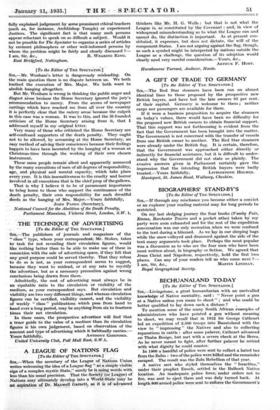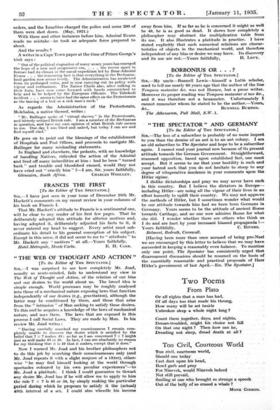BECHUANALAND TO-DAY
[To the Editor of THE SPECTATOR.] SIR,—Livingstone, a great humanitarian with an unrivalled knowledge of Native mentality, said : " Never point a gun at a Native unless, you mean to shoot " ; and who could be better qualified to lay down such a dictum ?
To mention some of the many South African examples of administrators who have pointed a gun without meaning to shoot, we may recall that in 1852 Sir George Cathcart led an expedition of 2,500 troops into Basutoland with the view to " impressing " the Natives and also to collecting reparations in cattle : after some palaver, Cathcart advanced on Thaba Bosigo, but met with a severe check at the Berea. As he never meant to fight, after further palaver he retired with what dignity could muster:
In 1906 a handful of police were sent to collect a hated tax from the Zultis : two of the police were killed and the remainder escaped. The result was the Zulu Rebellion of that year.
A native sect who styled themselves the " Israelites," under their prophet Enoch', settled in the Bulhoek Native locition. An Uuidequate -police force, under orders not to fire, was sent to eject them and was duly turned back. At length 800 armed police were sent to enforce the Government's
orders, and the Israelites charged the police and some 200 of them were shot down. (May, 1921.) With these and other instances before him, Admiral Evans made no mistake—he took an adequate force prepared to shoot.
And the results ?
A writer in a Cape Town paper at the time of Prince George's visit says :
" Out of the political stagnation of many weary years has emerged the hope of a new and progressive era, . . . the recent upset in Serowe had its climax in the naval expedition led by Rear-Admiral Evans . . . the reassuring fact is that everything in the Bechuana- land garden now seems lovely. The Administration has awakened from its prolonged coma, and is now carrying out its policy .with vigour and enthusiasm. The Native Chiefs also, after sulking in their huts, have now come forward with hands outstretched to help and to be helped by the European Officials. The Tshekedi incident . . . seems to have had the same effect on the Protectorate as the lancing of a boil on a sick man's neck."
As regards the Administration of the Protectorate, Molebaloa, a native thereof, writes :
' " Mr. Ballinger spoke of virtual slavery' in the Protectorate, and bitterly critized British rule. I am a member of the Bechuanas in question, and have my own opinion of what British rule means to me. One day I was blind and naked, but today I can see and find myself clad."
He goes on to point out the blessings of the establishment of Hospitals and Post Offices, and proceeds to castigate Mr.
Ballinger for many misleading statements.
In England and elsewhere, the pedants, with no knowledge of handling Natives, ridiculed the action of the Admiral and fired off many imbecilities at him : had he been " turned back " and trouble and bloodshed ensued, would they not have cried out " crucify him " Y—I am, Sir, yours faithfully,







































 Previous page
Previous page